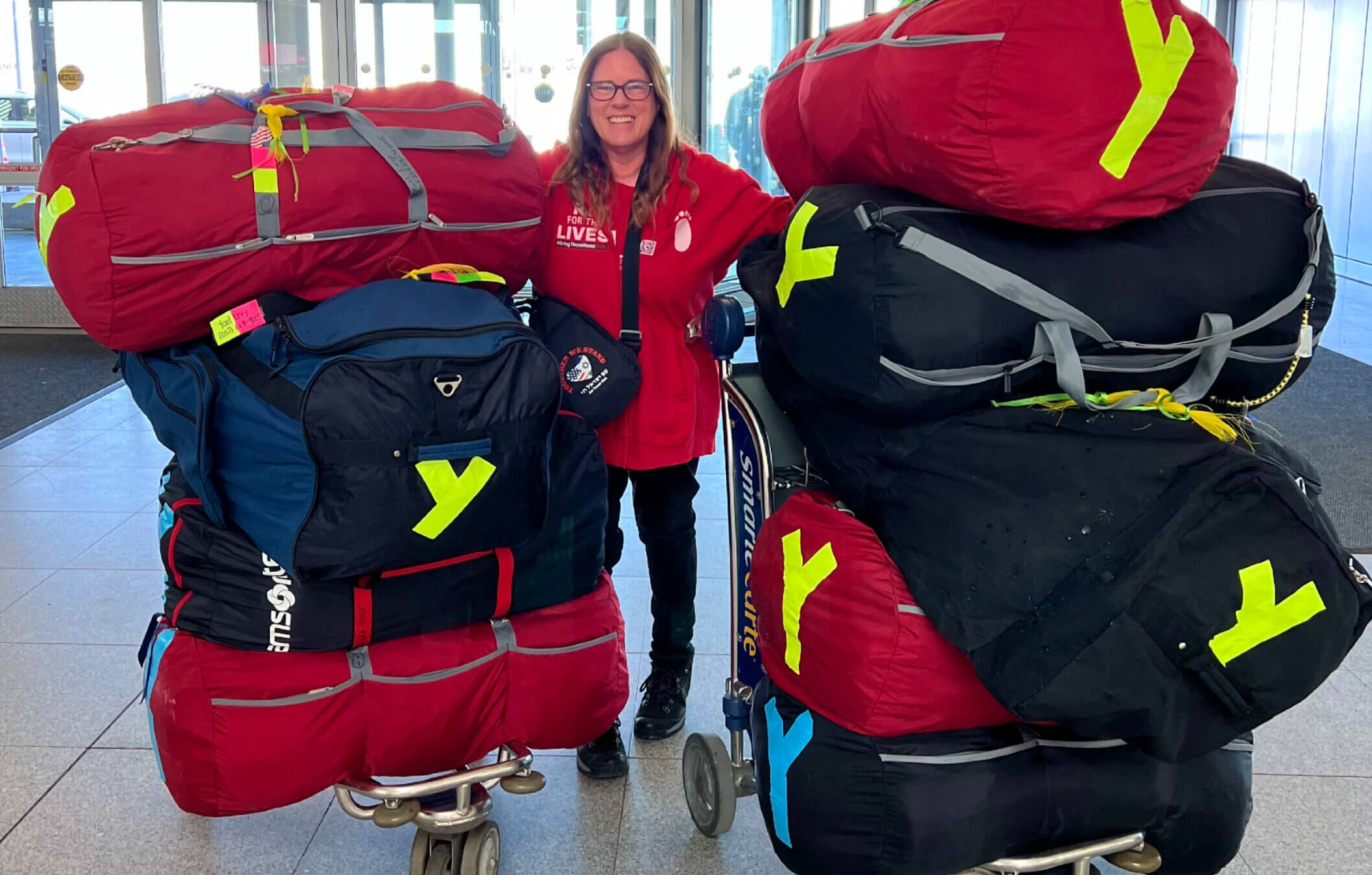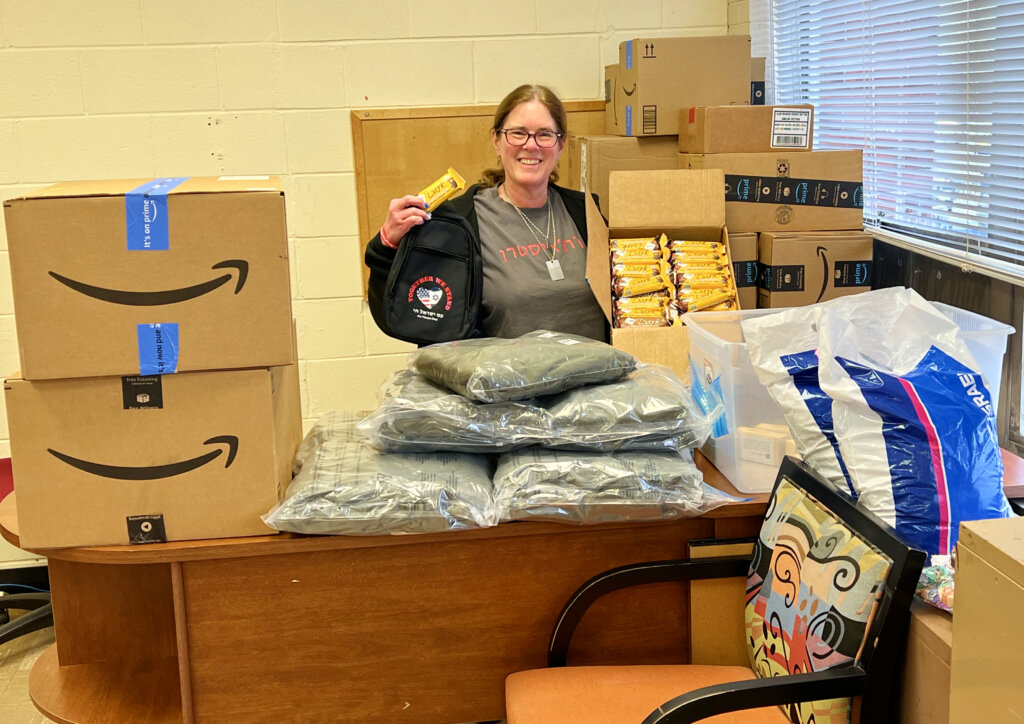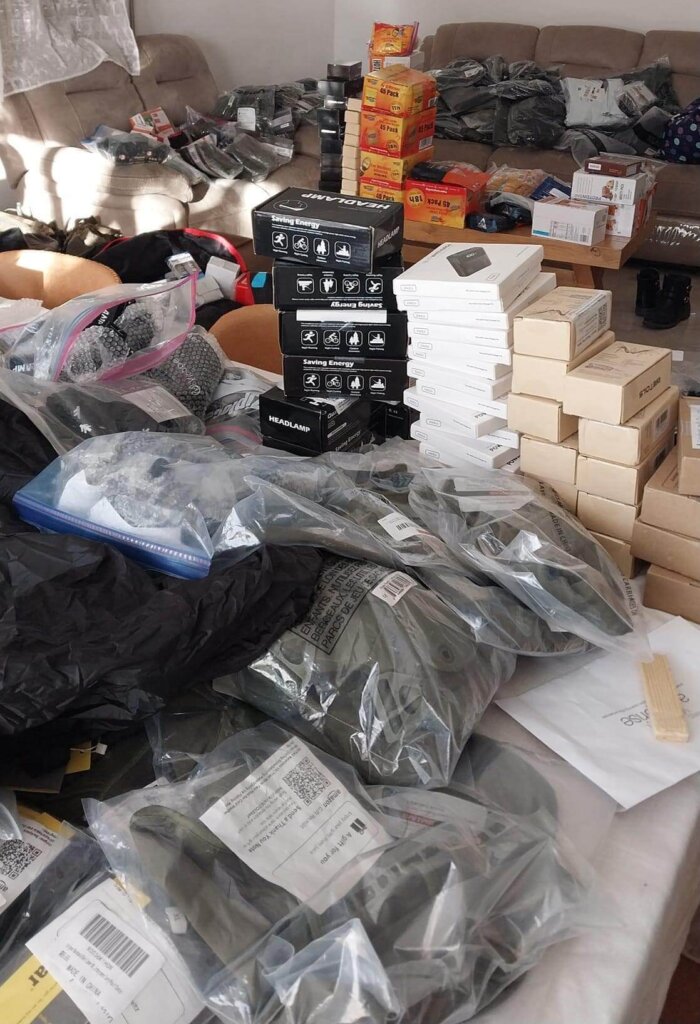‘They’re not alone’: A pair of cousins in Israel and Long Island help outfit IDF soldiers
‘Terri’s Angels’ sends Israeli troops the socks and sleeping bags they say they lack

They’ve asked for pocket knives and thermal gloves. Pup tents and sleeping bags. But also gauze, medical scissors and kits to help staunch bleeding.
The requests keep coming to a pair of cousins — one in Israel and one on Long Island — who together have organized a team of 150 volunteers to supply soldiers in the Israel Defense Forces who say they are not sufficiently outfitted for war.
Since Oct. 7, Yael Levy and Terri Ackerman have distributed 165 duffel bags worth of gear — weighing a total of more than 9,000 pounds — to fulfill the requests of thousands of reservists.
“There is not a day that I don’t get phone calls from soldiers,” said Levy, who lives just outside Jerusalem in the West Bank settlement of Kokhav Ya’akov.

She has three sons, all of whom were among the reservists mobilized after Hamas’ attack on Israel. They told their family about how their units have slept on disassembled cardboard boxes and eaten junk food because there weren’t enough healthy meals.
“We really have a very good army, but it is not geared to deal with 400,000 soldiers,” said Levy. “There are not enough helmets or socks to go around.”
For its military campaign in Gaza, now in its ninth month, the IDF has called up more reservists — about 300,000 — than at any prior time in Israel’s history. While it seemed reasonable to many that this unprecedented number of soldiers would initially entail some shortfalls, the continuous flow of necessities from diaspora Jews to Israeli units has seemingly embarrassed the Israeli government, which forbids soldiers for soliciting or accepting goods from donors.
The Israeli consulate in New York this week had no comment on the subject or the cousins’ supply chain. “Today, all soldiers have the required equipment according to their division and mission,” the Israel Defense Forces Spokesperson’s Unit in April told the Jewish Telegraphic Agency, which wrote about soldiers’ reliance on donated gear.
But the constant stream of requests to Ackerman and Levy, who are both 63, seems to bear that reliance out. Ackerman, who lives in Commack, Long Island, near New York City, said she can’t explain the disconnect between what the IDF is saying and what she’s still hearing from soldiers. “The commanders are telling us they need it,” she said.
Her all-volunteer operation — now known as “Terri’s Angels,” a name bestowed by an Israeli soldier — is one of dozens of such efforts among diaspora Jews, some of which, such as the IDF Chesed Center, also based on Long Island, regularly send even larger donations to IDF units. Another well-known one is “Boots for Israel.”
Ackerman has given talks at synagogues and elsewhere on how to help outfit the IDF. At least a dozen Jewish groups in the New York region, including the B’nai Brith Youth Organization, have affiliated with the Angels.
Those who have worked with Ackerman and Levy said the initiative also serves a less obvious purpose: to connect Israeli and American Jewish supporters of Israel at a time when both are feeling increasingly isolated. Israel is defending itself against charges of genocide at the International Criminal Court. And protesters worldwide since the Oct. 7 attack have decried Israel’s response to the massacre: a military campaign that has killed tens of thousands of Palestinians.
“For the last 20 years we suffered from missile attacks from Hamas,” one Israeli Jew wrote on Terri’s Angels Facebook page. “Thanks for your support of my state.”
“Am Israel Chai,” an American donor posted to the page — in Hebrew, “the people of Israel live.”
‘They need red flashlights’

Ackerman first sent supplies to Israel through a drive at her synagogue, East Northport Jewish Center, and then learned from her Israeli cousin that shortages persisted. Hoping to meet the needs of many more units, Ackerman started a private Facebook page. She asks for donations, and for volunteers who are flying to Israel and might be willing to take duffel bags of supplies — all requested by the soldiers themselves.
She and her volunteers can’t field the requests from every soldier, so they ask to speak with their commanders. “Usually the commander knows what’s needed and what’s not,” Ackerman said. She tells them what she can and cannot procure. She has a hard time, for example, coming by tactical vests. But she knows what flashlights to buy.
“They need red flashlights. You’re not allowed to have a white or yellow light because the enemy could see you,” she explained. “With the red light, you see the enemy but he doesn’t see you.”
Each duffel bag weighs between 50 and 60 pounds, and includes gear for about five IDF units. When it arrives at Tel Aviv’s Ben Gurion airport, Levy and groups of her 60 volunteers take over, repackaging bags by unit, and then transporting them to IDF bases.
Ackerman conveys the soldiers’ requests to donors in the form of an Amazon wishlist on Facebook. To become part of the online group, you have to declare yourself a supporter of Israel and answer a question: “Who is the prime minister of Israel?”
The Suffolk Y Jewish Community Center in Commack stores the donations until enough have accumulated for a shipment, and a traveler has agreed to help transport them to Israel. Then groups of volunteers — who have included a 5-year-old Jewish day school student and a 97-year-old from an assisted living facility — pack the goods up.
“They feel like they’re making a difference,” Ackerman said.
Steven Walvick, a rabbi and cantor at the East Northport Jewish Center, said Ackerman’s project is strengthening ties between American and Israeli Jews in a way that is “more important than the duffel bags themselves.”
She asks donors to attach a tag to their donations with their names and to write letters to soldiers, so they will know who to thank. And she encourages the soldiers to send video thank-yous.
“One of the things that they say all the time in the videos is that these little donations — or big donations — are really making a serious difference in their lives to get their missions done,” she said.
The duffels send the message, she added, that “they’re not alone.”
Correction: An earlier version of this story mispelled the name of a rabbi. He is Steven Walvick, not Steven Salvick.
A message from our Publisher & CEO Rachel Fishman Feddersen

I hope you appreciated this article. Before you go, I’d like to ask you to please support the Forward’s award-winning, nonprofit journalism so that we can be prepared for whatever news 2025 brings.
At a time when other newsrooms are closing or cutting back, the Forward has removed its paywall and invested additional resources to report on the ground from Israel and around the U.S. on the impact of the war, rising antisemitism and polarized discourse.
Readers like you make it all possible. Support our work by becoming a Forward Member and connect with our journalism and your community.
— Rachel Fishman Feddersen, Publisher and CEO




























